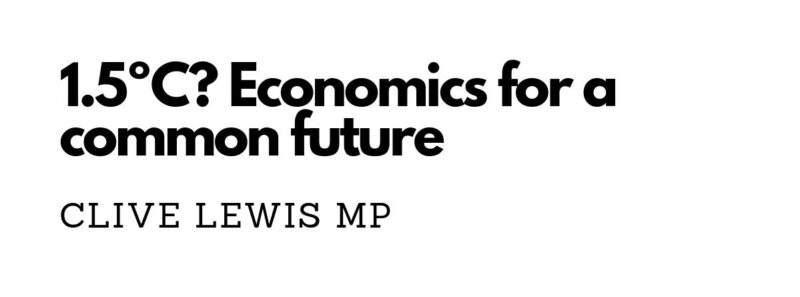Clive Lewis For Norwich South

A Labour party member once told Ed Miliband, after listening to him speak about the dangers of climate change, “Ed, Martin Luther King didn’t say ‘ I have a nightmare’. He said ‘I have a dream”. And yet, with publication of this week’s stark new IPCC report we have what appears to be an unfolding global ‘nightmare’ we seem incapable of preventing. Hardly the stuff of inspiration. So how do we turn this unfolding ‘existential threat’ into the language of hope?
The current orthodoxy is to speak of the ‘economic opportunities’ tackling climate change represents. There is a lot of truth to this narrative – pushing through rapid decarbonisation calls for massive infrastructure investments and hundreds of thousands of good jobs. Yet implicit within it is the assumption that, given a few tweaks, the current neoliberal economic model will, at some point, when markets are good and ready, step up to the challenge.
But as Professor Nick Stern observed back in 2006, ‘climate change is the greatest market failure the world has ever seen’. In other words, markets will not solve climate breakdown on their own. Nor will they stop the rapidly deteriorating levels of biodiversity loss and breaching of of planetary boundaries. In fact I would go further and argue that the entire paradigm of deregulated markets, the all consuming drive for profit maximisation and the resulting gross inequality, has itself acted as the greatest recent driver of climate change and ecological degradation.
So perhaps rather than the current binary choice between climate change as either a nightmare or a ‘massive economic opportunity’, we need something more nuanced, more authentic. A political and economic narrative that has an honest analysis of what is happening and why, a vision of what a modern, sustainable economy actually looks like, and a route map to get to this ‘promised land’. This then is the challenge Labour’s shadow treasury team has embarked upon, alongside a group of climate scientists and environmental economists recruited to help us puzzle this out. One of the core tasks of this work is to make sure that Labour’s programme for government is consistent with our commitments under the Paris Agreement. To date some of the things I’ve learned have been deeply troubling.
Despite the government’s rhetoric, UK emissions have not fallen at all since 1990 – if you account for emissions from international aviation and shipping, and consumption of imported goods. Meanwhile, when we look closely at the UN goals and UK carbon budgets to limit warming to less than 2ºC, we see they rely on future ‘negative emissions technologies’. In other words we’re counting on our children and grandchildren to devise technologies that will suck vast amounts of carbon out of the atmosphere after 2050. No pressure, kids.
These two key issues – zero progress hidden by misleading carbon accounting and the fact we’re relying on sci-fi technology and blind optimism – lead to a sobering scientific conclusion: that a country like the UK needs to start halving its emissions every decade from here on in. This is a much steeper trajectory of reductions than the one we are supposed to be on today. Fail to do that in any one decade and you can kiss goodbye to attaining a long-term 2C and below target.
This is serious. It means in effect that any economic investment activity – whether housebuilding, airport expansion, re-industrialisation, new roads or public transport infrastructure – that doesn’t contribute to halving our carbon output in the next 7-9 years, should under almost no circumstances be embarked upon. Longer-term decarbonisation targets beyond this time frame are all but irrelevant can-kicking exercises for politicians today. We’re now officially out of road, and it is short-term decarbonisation goals the next Labour government must focus on if the science is to be acted upon in time.
As sobering as this all is, this is where the language of ‘opportunity’ comes into play. But rather than just accepting the current economic imperatives, a meaningful political response to climate change offers opportunities for radical revision of both the role and remit of the Treasury in this process as well as other departments, local govt, civil society and of course markets.
At this year’s Party conference Jeremy Corbyn outlined a full embrace of the economic opportunities decarbonisation offers our country. But for those that understand the Corbyn project, there’s also another prized objective – that of social and economic justice. If we play it right, the radical economic transition which the science demands can open up an unprecedented opportunity to reinvent Britain as a better, fairer, smarter and more compassionate place to live.
That’s why the principle of equity will be central to Labour’s approach to tackling climate change. Today, the richest 10% of the world’s population are responsible for half of all emissions, while those least responsible for causing climate change will be hit first and worst by its impacts. Even within the UK, average emissions from richer households are 50% higher than from poorer ones. The implication here is that efficient carbon mitigation policies must target the high emitters first. As climate scientist Professor Kevin Anderson puts it, “you can’t take emissions away from people who haven’t got them.”
And therein lies the political truth at the heart of the sustainability and decarbonisation project we’ve embarked upon. The understanding that tackling inequality – a core Labour purpose – dove-tails perfectly with saving the planet. A new socialist narrative for the 21st century beckons, if we have the courage and vision to pursue it.
